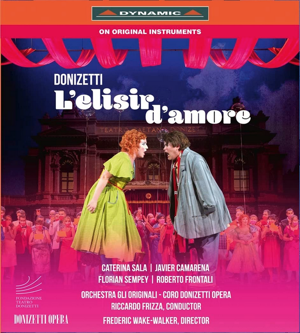
Gaetano Donizetti (1797-1848)
L’elisir d’amore, melodramma giocoso in two acts with libretto by Felice Romani
Caterina Sala (Adina), Javier Camarena (Nemorino), Florian Sempey (Belcore), Roberto Frontali (Dulcamara)
Coro Donizetti Opera
Orchestra Gli Originali/Riccardo Frizza
Frederic Wake-Walker (stage direction)
rec. 19 November 2021, Teatro Donizetti Bergamo, Italy
Reviewed in surround sound
DYNAMIC 57944 Blu-ray [142]
Fondazione Teatro Donizetti set up in 2014 in Bergamo pursues a number of cultural tasks, above all the preservation and promotion of the legacy of Bergamo’s most famous son, Gaetano Donizetti, not least his seventy operas. The Foundation conducts research into his scores, and the findings lie behind the artistic work of its international festival Donizetti Opera, with Francesco Micheli’s artistic direction. They revive Donizetti’s lesser-known works, as well as the more famous operas, edited and revised by the Foundation’s musicological work led by Paolo Fabbri. Musical director Riccardo Frizza presents the works as closely as possible to Donizetti’s intentions. Thus scores can be performed uncut, probably for the first time anywhere, as in this performance. This L’elisir d’amore is also played on original instruments. The boklet contains a fascinating interview with the conductor. He explains in detail why the different timbres, balance and lower pitch are so musically revealing. One learns how the composer took a traditional opera buffa tale and invested it with deeper characterisation and theatrical effect.
L’elisir d’amore has remained one of the world’s most popular and most performed operas. It is the first of Donizetti’s operas that has never really left the repertoire. Nemorino is in love with Adina, who is indifferent and seems to prefer Sergeant Belcore. She eventually chooses Nemorino, helped – well, sort of – by the charlatan Dr Dulcamara’s “elixir of love”, which is just cheap wine. Frederic Wake-Walker’s admirable new staging opens in a Bergamo piazza, not the rural scene the text implies, with the Teatro Donizetti facade itself as background. The stage director explains in the booklet why he wished to reflect Bergamo street life, its puppets included.
The overture is played with the curtain up as some children act out a scenario we are about to see performed by their adult selves. Most costumes are modern street clothes, especially the chorus (who sing masked, since this was filmed in 2021 during the pandemic). The male principals are costumed in character. Dulcamara’s gaudy stripes suggest a fake self-importance; Nemorino’s clownish winter garb and white hat hint at his naivety and lack of self-consciousness; bold soldier Belcore is in a toy soldier’s uniform. White cheeks with a patch of rouge speak of these characters’ commedia dell’arte connection. Frederic Wake-Walker directs with comedic understanding, pathos included, and the cast of singers respond well to the specific character ideas he has given them.
That very consistent cast is led by Caterina Sala’s clever, elusive yet sympathetic Adina. She travels with conviction a road from regarding Nemorino as a silly youth to feeling sorry for him, to realising she loves him. Her lovely voice sounds sweet through its register, and never loses that quality even in louder moments or at the top of the singer’s register. She has a good trill, and her vibrato is just right for the more emotional moments, as in the Act Two aria Prendi per me sei libero, sung here in an impressive alternative version from Alberto Zedda’s critical edition.Adina appears to be an ideal role for Sala.
Javier Camarena’s Nemorino is more ridiculous in his naivety and gullibility than some other performers. Yet he is never irritating, merely a callow if complicated young man with a lot to learn. He sings with pleasing tone and line, and is touching enough in his famous solo Una furtiva lagrima. If it is not quite the vocal showpiece as it is on a hundred recital discs, it is better for being kept in character, with plenty of longing but never lachrymose, and it is very well received by the audience. There is a very accomplished authentic bassoon accompaniment for the number, too.
Florian Sempey makes a strong Belcore, singing with stern vigour, and Roberto Frontali’s Dulcamara has impressive tone and clear diction even in his swift patter moments. The chorus of Donizetti Opera sound well-prepared and sing as if they are enjoying themselves despite the masks. The playing of the authentic instruments of Orchestra Gli Originali give much pleasure, especially with their solos in quieter passages. Riccardo Frizza conducts a well-balanced performance with authority and affection. The camera work serves the opera well, and the Blu-ray disc has the usual excellent images and atmospheric surround sound. Those who want a full text of Donizetti’s enchanting score, and on authentic instruments, have no choice but this release at present, but they should not be disappointed by such a fine production and performance.
Roy Westbrook
Help us financially by purchasing from



Additional personnel
Giannetta: Anaïs Mejías
Master of ceremonies: Manuel Ferreira
Fortepiano: Daniela Pellegrino
Chorus master: Fabio Tartari
Set design: Federica Parolini
Costume design: Daniela Cernigliaro
Lighting design: Fiammetta Baldisserri
Puppets: Daniele Cortesi
Video director: Matteo Ricchetti
Recording details
Video Format: NTSC
Aspect ratio: 16:9
Audio Format: PCM STEREO 2.0 – DTS 5.1 HD Master Audio
Region code: 0 (all regions)
Subtitles: Italian, English, French, German, Japanese, Korean
Booklet Notes: Italian, English


















